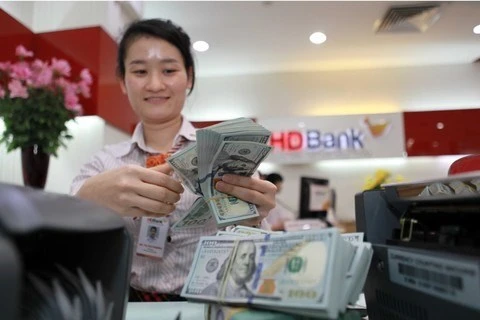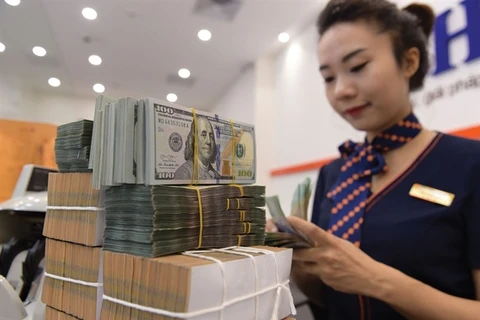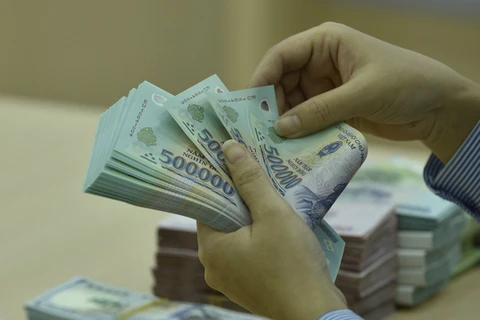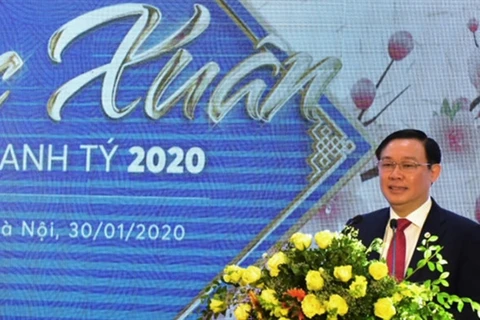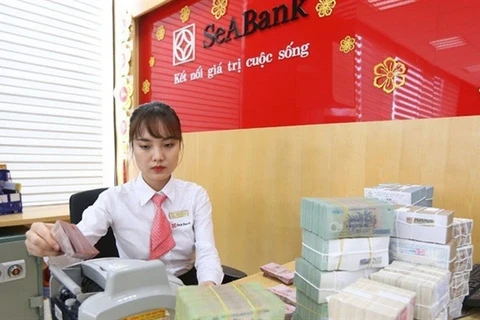 Deputy Governor of the State Bank of Vietnam (SBV) Dao Minh Tu chairs a conference in Hanoi on February 6 to discuss ways to help coronavirus-hit businesses. (Photo: VietnamPlus)
Deputy Governor of the State Bank of Vietnam (SBV) Dao Minh Tu chairs a conference in Hanoi on February 6 to discuss ways to help coronavirus-hit businesses. (Photo: VietnamPlus)
Hanoi (VNA) – Deputy Governor of the State Bank of Vietnam (SBV) Dao Minh Tu asked lenders to not raise interest rates to support enterprises affected by the outbreak of the novel coronavirus (2019-nCoV), during a conference on February 6.
The Hanoi event, chaired by Tu, gathered representatives of 21 commercial banks in the country to seek measures to remove difficulties for virus-hit companies.
Addressing the event, the SBV Deputy Governor requested the commercial banks to proactively grasp business performance and the extent of damage exprienced by borrowers due to the epidemic, particularly those in tourism, agriculture and foreign trade, so the banks can promptly adopt proper support measures for them, such as rescheduling repayments and lowering interest rates.
They must actively instruct and help the borrowers remove barriers in accessing new loans, Tu noted.
Most of the local lenders reported that they saw slight drops in credit growth as a result of the outbreak.
Pham Toan Vuong, Deputy Director General of Agribank, said at the moment it is not possible to calculate the number of affected borrowers and how much the damage is. The bank is working with its customers to identify which sectors have been hit directly or indirectly by the disease.
Not all sectors are suffering from the epidemic, there are some benefiting from it, Vuong said, adding that it is important to make careful assessments.
Agribank stands ready to provide maximum support for customers if they encounter difficulties due to the 2019-nCoV outbreak, he noted.
Meanwhile, Kienlongbank vowed to cut its interest rate by 3 percent per year for borrowers who used the loans to develop farming of certain fruits, such as dragon fruit, watermelon, durian, mango, jack fruit and banana.
It will also waive fines on late payments for those affected.
Asia Commerical Joint Stock Bank (ACB) plans to launch a credit package with a preferential interest rate for new borrowers.
The Vietnam Prosperity Bank, or VPBank, has announced interest rate cuts for enterprises suffering from the epidemic. A maximum reduction of 1.5 percent per year will be applied to unsecured loans and 1 percent per year for secured loans taken out by firms operating in the vulnerable sectors, including transport, logistics, hospitality, and tourism, as well as domestic exporters of agricultural and fishery products to and importers of materials from China.
VPBank estimated that nearly 1,000 of its customers are dealing with the blow from the coronavirus and the number is on the rise as the outbreak is getting more and more complicated.
Leaders of the banks proposed the SBV issue more specific guidelines on how they can effectively offer aid to those in need.
The central bank’s Departments of Monetary Policy and Credit were asked to quickly complete drafting support policies for affected borrowers. It must also ensure that the execution of these policies will not cause volatility in the credit market and will not affect the classification and handling of bad debts.
Deputy Governor Tu added that commercial banks must not raise interest rates as their liquidity remains adequate. The central bank will make necessary adjustments to help banks lower interest rates and support companies and local people in emergencies, aside from providing credit support, he remarked.
Earlier, the SBV Governor on February 4 issued a dispatch requesting credit institutions to balance capital sources to meet the financial demand of manufacturers and businesses./.

